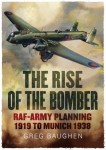1⁄1
Monday, November 30, 2015 - 05:12 PM UTC
Greg Baugham examines the RAF's bombing policy in the wake of WWI. The detailed study covers the period through the so-called “Golden Age” up the rush to re-arm in the face of the threat from Nazism.
The Rise of the Bomber - RAF-Army Planning 1919 to Munich 1938
Greg Baughen
The story of how the RAF based its inter-war defence strategy on weapons of mass destruction and why it failed
· The story of the first defence policy based on weapons of mass destruction
· An account of the first attempt to substitute air power for armies and navies
· The truth about how the Air Staff misled the government, deceived itself and left the country defenceless
· Based on original archive material and supplemented with many unpublished photographs
The Rise of the Bomber: RAF-Army Planning 1919 to Munich 1938, the second book in the series, author Greg Baughen uses archive material to reassess British air policy in the inter-war years. Gone is the image of a Royal Air Force starved of funds and struggling for survival against a bullying Army and Navy. Instead, Baughen describes how the Air Force set out to replace both the Army and Navy. It blocked the development of a modern air/tank strategy and won government backing for a defence policy built around the bomber – the first weapon of mass destruction. Yet the time and money invested in the policy achieved nothing. When put to the test in 1938, the equipment proved inadequate and the strategy flawed. The Air Staff had misled the government, deceived itself and left the country defenceless. Yet, all was not lost. Unintentionally, the Air Ministry had been creating the aircraft that might still save the country...
Please remember, when contacting retailers or manufacturers, to mention that you saw their products highlighted here - on AEROSCALE.
Greg Baughen
The story of how the RAF based its inter-war defence strategy on weapons of mass destruction and why it failed
· The story of the first defence policy based on weapons of mass destruction
· An account of the first attempt to substitute air power for armies and navies
· The truth about how the Air Staff misled the government, deceived itself and left the country defenceless
· Based on original archive material and supplemented with many unpublished photographs
The Rise of the Bomber: RAF-Army Planning 1919 to Munich 1938, the second book in the series, author Greg Baughen uses archive material to reassess British air policy in the inter-war years. Gone is the image of a Royal Air Force starved of funds and struggling for survival against a bullying Army and Navy. Instead, Baughen describes how the Air Force set out to replace both the Army and Navy. It blocked the development of a modern air/tank strategy and won government backing for a defence policy built around the bomber – the first weapon of mass destruction. Yet the time and money invested in the policy achieved nothing. When put to the test in 1938, the equipment proved inadequate and the strategy flawed. The Air Staff had misled the government, deceived itself and left the country defenceless. Yet, all was not lost. Unintentionally, the Air Ministry had been creating the aircraft that might still save the country...
Please remember, when contacting retailers or manufacturers, to mention that you saw their products highlighted here - on AEROSCALE.
Click Star to Rate
No one has rated this yet.
THIS STORY HAS BEEN READ 3,161 TIMES.
| Fonthill Media Reviews | MORE |
| Vietnam War Heli Nose Art by Jim Starkweather | |
| History of the Gloster Javelin by Andy Brazier | |
| Thud Pilot by Andy Brazier | of 1 ratings, 100% found this helpful | |
| De Havilland Vampire by Tim Hatton | |
| Britian's Overseas Airlines by Richard Tonge | |
| Soviet Cold War Fighters by Andy Brazier | of 2 ratings, 50% found this helpful | |
| The Avro Manchester by Rowan Baylis | |
| Douglas DC-3 by Frederick Boucher | of 1 ratings, 100% found this helpful | |









Comments